Prince William County School Board passes revised code of behavior
The Prince William County School Board approved the school system’s revised code of behavior, including new restorative disciplinary practices but with changes to controversial sections in a previous draft.
The version approved at Wednesday night’s board meeting removed “restorative practice” conferences or circles from the list of responses to more serious misconduct, but left them in as potential responses to low-level misbehavior. They’re meant, division administrators say, to serve largely as preventative tools, helping students to model better behavior and preventing them from escalating misconduct that could ultimately lead to suspension.
“It’s responsive to the feedback that we agreed with when we got feedback from parents and the school board,” Superintendent LaTanya McDade said.
As was previously the case, suspension remains on the table for schools when more serious infractions occur.
The approved code of conduct also includes new sections on “educator cultural competency” and a “multi-tiered system of supports,” calling for disruptive behavior to be met with a “student support team,” goal setting and “early implementation of evidence based interventions.”
Intended to serve as alternatives to more serious punishment for minor misconduct, the use of what have been termed “restorative practices” has grown in school systems across the country. Ashley Reyher, the division’s superintendent for special education, said research showed that where the practices were implemented, rates of discipline fell “due to them responding positively.”
“It’s really to get ahead of student behaviors occurring,” she said. “It’s working with schools to teach students ways that they can demonstrate the expected behaviors positively. … It’s very different than replacing consequences.”
Board members Justin Wilk (Potomac) and Lillie Jessie (Occoquan) had both expressed concern over the original draft of changes, saying teacher and administrator buy-in could be hard, and that more severe punishments needed to be on the table when warranted.
Both voted for the new code on Wednesday, saying the revisions made them more comfortable.
“I’m profoundly grateful. I feel heard. I think a lot of people, with these revisions and changes, will feel heard,” Wilk said Wednesday.
Level associate superintendents will be tracking discipline data on a “regular basis,” according to Deputy Superintendent Carol Flenard. Training on the new code will take place in August for all school-based administrators and teachers, though she pointed out that it would be optional for the latter.
Behavioral problems have been on the rise locally and around the country since schools closed during the COVID-19 pandemic. The new code also includes state-mandated language requiring that principals or their designees inform the parents or guardians of any instances of bullying involving their child within 24 hours of knowing about it.
“I know behaviors, they were rough this year,” Coles Board Member Lisa Zargapur said. “I believe this is an adult problem. It’s parents, it’s teachers, it’s administrators. We all have to work together to make sure that our kids are getting the best instruction, … academically but also behaviorally.”
This article was originally published by Jared Foretek in InsideNova, it can be found here.
